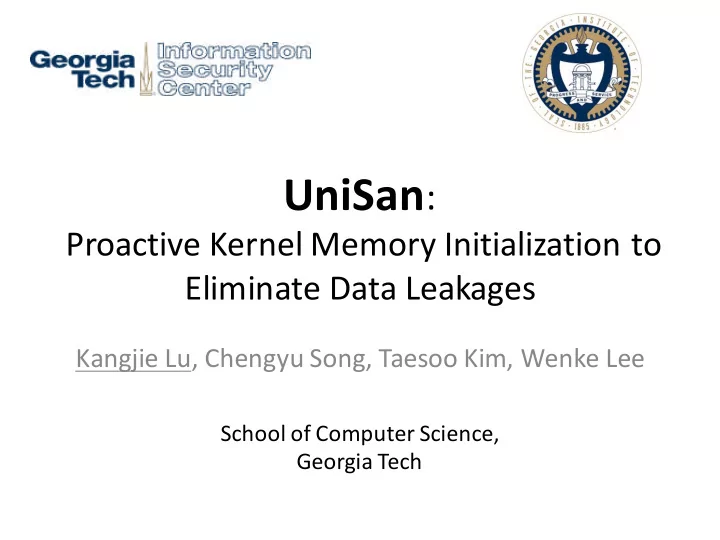

UniSan : Proactive Kernel Memory Initialization to Eliminate Data Leakages Kangjie Lu, Chengyu Song, Taesoo Kim, Wenke Lee School of Computer Science, Georgia Tech
Any Problem Here? /* File: drivers/usb/core/devio.c*/ /* define data structure “usbdevfs_connectinfo” */ struct usbdevfs_connectinfo{ unsigned int devnum; unsigned char slow; 3-byte padding }; /* create and initialize object “ci” struct usbdevfs_connectinfoci = { .devnum = ps->dev->devnum, .slow = ps->dev->speed == USB_SPEED_LOW }; /* copy “ci” to user space */ Information leak! copy_to_user(arg, &ci, sizeof(ci));
Security Mechanisms in OS Kernels kASLR : Randomizing the address of code/data Memory Memory Memory Code/data ? Code/data Code/data 1 st boot 2 nd boot 3 rd boot … n boot – Preventing code-reuse and privilege escalation attacks StackGuard : Inserting random canary in stack – Preventing stack corruption-based attacks
The Assumption of Effectiveness Assumption: No information leak Memory kASLR Randomized address StackGuard Random canary A single information leak renders these security mechanisms ineffective!
Infoleak in the OS (Linux) Kernel According to the CVE database # of reported Infoleak bugs in the Linux kernel Number 60 40 20 0 2002 2003 2004 2005 2006 2007 2008 2009 2010 2011 2012 2013 2014 2015 2016 These security mechanisms are often bypassed in reality Sensitive data (e.g., cryptographic keys) can also be leaked.
Our research aims to eliminate information leaks in OS kernels
Causes of Infoleaks • Uninitialized data read : Reading data before initialization, which may contain uncleared sensitive data • Out-of-bound read : Reading across object boundaries • Use-after-free : Using freed pointer/size that can be attacker controlled • Others : Missing permission check, race condition
Causes of Infoleaks (cont.) Infoleak Causes in the Linux Kernel (since 2013) Model checking, etc. Others (13.6%) Uninitialized data read Uninitialized data OOB and UAF read (57.3%) read (29.1%) Out-of-bound and use- after-free read Others (e.g., logic error) Our focus Memory safety Similarly, Chen et al. [APSys’11] showed 76% infoleaks (Jan. 2010 - Mar. 2011) are caused by uninitialized data reads
From Uninitialized Data Read to Leak 1. Deallocated memory is not cleared by default. 2. Allocated memory is not initialized by default. 3. Reading the uninitialized memory -> leak. Memory Memory Memory Object B Object B Object A sensitive sensitive sensitive sensitive 1 2 3 4 User A allocates User A deallocates User B allocates User B reads object A and object A; object B without Object B; writes “ sensitive ” “ sensitive ” is not Initialization; “ sensitive ” in to it cleared “ sensitive ” kept leaked!
Troublemaker: Developer Missing element initialization: Blame the developer. J Difficult to avoid, e.g., – Data structure definition and object initialization may be implemented by different developers
Troublemaker: Compiler Data structure padding: A fundamental feature improving CPU efficiency /* both fields (5 bytes) are initialized */ struct usbdevfs_connectinfo ci = { .devnum = ps->dev->devnum, struct usbdevfs_connectinfo { .slow = ps->dev->speed == unsigned int devnum; USB_SPEED_LOW unsigned char slow; }; /* 3-bytes padding */ /* leaking 3-byte uninitialized padding }; sizeof(ci) = 8 */ copy_to_user(arg, &ci, sizeof(ci));
C Specifications (C11) Chapter §6.2.6.1/6 “When a value is stored in an object of structure or union type, including in a member object, the bytes of the object representation that correspond to any padding bytes take unspecified values.”
Responses from the Linux Community Doubted Kees Cook: Confirmed Willy Tarreau: Blamed GCC Linus Torvalds: Agreed solution Ben Hutchings:
Detecting/Preventing Uninitialized Data Leaks The -Wuninitialized option of compilers? Simply initialize all allocations? Our UniSan approach: 1) Conservatively identify unsafe allocations (i.e., with potential leaks) via static program analysis 2) Instrument the code to initialize only unsafe allocations
Detecting Unsafe Allocations Integrating byte-level and flow-, context-, and field-sensitive reachability and initialization analyses Reachability analysis Sinks Sources (e.g., (i.e., Data flow copy_to_user) allocations) Initialization analysis
Main Challenges in UniSan • Sink definition – General rules • Global call-graph construction – Type analysis for indirect calls • Byte-level tracking – Offset-based analysis, “GetElementPtr” Be conservative! Assume it is unsafe for special cases!
Instrumentation Zero-initializations for unsafe allocations: – Stack: Assigning zero or using memset – Heap: Adding the __GFP_ZERO flag to kmalloc Instrumentations are semantic preserving – Robust – Tolerant of false positives
Implementation • Using LLVM – An analysis pass and an instrumentation pass • Making kernels compilable with LLVM – Patches from the LLVMLinux project and Kenali [NDSS’16] • Optimizing analysis – Modeling basic functions $ unisan @bitcode.list How to use UniSan:
Evaluation Evaluation goals – Accuracy in identifying unsafe allocations – Effectiveness in preventing uninitialized data leaks – The efficiency of the secured kernels Platforms – Latest mainline Linux kernel for x86_64 – Latest Android kernel for AArch64
Evaluation of Accuracy Statistics of various numbers: – Only 10% of allocations are detected as unsafe . Module Alloca Arch Malloc Unsafe Unsafe Percent Alloca Malloc X86_64 2,152 17,878 2,929 1,493 386 9.0% AArch64 2,030 15,628 3,023 1,485 451 10.3%
Evaluation of Effectiveness Preventing known leaks: – Selected 43 recent leaks with CVE# – UniSan prevented all of them Detecting unknown leaks – With manual verification
Confirmed New Infoleaks (Selected) File Object Leak Cause CVE Bytes rtnetlink.c map 4 Pad CVE-2016-4486 devio.c ci 3 Pad CVE-2016-4482 af_llc.c info 1 Pad CVE-2016-4485 timer.c tread 8 Pad CVE-2016-4569 timer.c r1 8 Pad CVE-2016-4578 netlink...c link_info 60 Dev. CVE-2016-5243 media- u_ent 192 P&D AndroidID- device.c 28616963 more… more… … … more…
Evaluation of Efficiency Runtime overhead (geo-mean %) Category Benchmarks Blind Mode UniSan (x86_64) (x86_64) System LMBench 4.74% 1.36% operations Server ApacheBench 0.8% <0.1% programs User SPEC Bench 1.92% 0.54% programs Analyses took less 3 minutes. Binary size increased < 0.5%.
Limitations and Future Work • Custom heap allocators – Require annotations • Close-sourced modules – Not supported • Other uninitialized uses, e.g., uninitialized pointer dereference • GCC support (in progress)
Conclusions • Information leaks are common in OS kernels. • Uninitialized read is the dominant cause. • Developers are not always to blame— compilers may also introduce security problems. • UniSan eliminates all uninitialized data leaks.
Try UniSan: https://github.com/sslab-gatech/unisan
Recommend
More recommend